First meeting 'a good beginning' for comfort care home effort
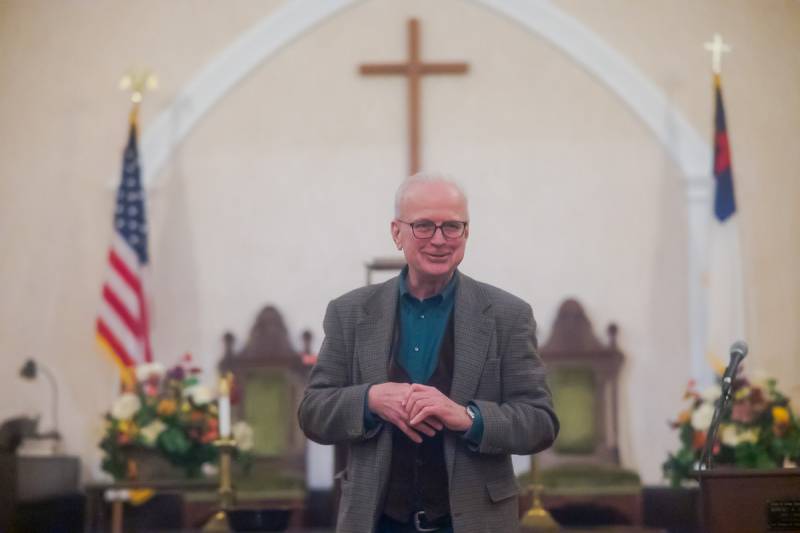
Photo by Howard Owens
As a nurse in long-term and outpatient family care, Joy Hammond has seen the need for more options when it comes to caring for terminally ill people, she says.
“I would say, in general, the staff in hospitals and staff in long-term care do the best that they can. But the reality is, there's just not enough of them. It is simply the fact of the matter. And you can have the biggest heart for the patient, or the resident in that case, who is dying, but you cannot be at their bedside 24/7, which is not possible. And so to be able to have that option to have a comfort care situation where you can have a volunteer or paid staff be there and be focused on that patient, be focused on their family, that is a wonderful, wonderful thing,” Hammond said during a meeting Monday night at Stone Church in Bergen. “Life care is something I have experienced with my nursing career through the years. And so I'm very, very excited about the possibility of bringing comfort care, bringing a comfort care option here to this part of the county, because there really isn't anything here.”
She was one of about 30 people who attended an initial Genesee Valley Regional Community Cares meeting about establishing a comfort care home on the east end of Genesee County. An effort that began in 2019 and was stalled by Covid. It has now surged forward with the Rev. Robert “Mike” Stuart, Louie Crocker, Keven Kent, Clerk of Session Deb Godllove, of Stone Church Presbyterian, professional organizer Frank Strock, who has volunteered to lead the way, and others, including independent end-of-life doula Ashley Manuel.
For anyone unfamiliar with comfort care homes, such as Crossroads House in Batavia, they are two-bed facilities for people diagnosed with three months or less to live. Unlike the typical hospital or nursing home, however, comfort care homes are actually more like one’s home — with no restrictions on visiting hours or what foods and drinks one may have, and individual customized attention to fit that person’s needs and personality. There are nurses on staff and/or on-call and round-the-clock volunteers to be there for companionship, to fix meals, bake cookies, fetch a beer, tell a joke, share some tears, and anything in between.
As Hammond said, from her personal and professional experience, “It just makes the end of life so much … better.”
You know, an all-around experience, it can be truly a beautiful thing, which is kind of crazy in our Western culture; we don’t look at death as beautiful, but it really can be a beautiful thing in the correct environment that supports the family and the person who’s passing,” she said. “So I really am very supportive. I hope that we can make it work.”
She said she's a resident of Bergen and willing to volunteer for this effort once it gets going.
Stuart, a Marine veteran who later entered the seminary, has been so committed to the effort that he donated his salary while working a stint at Stone Church and shared his humble beginnings during an internship at Memorial Sloan Kettering Cancer Center in New York City. He was a chaplain during the beginning of the AIDS epidemic, and the blood supply in the city was infected.
"So I was a chaplain for a lot of those kids that were hemophiliacs that died from the blood supply. They were infected, but they had the best treatment they could ever get. So since then, I felt a calling to end-of-life care and served many years in that capacity,” he said, quoting Dr. Emily Smith about loving your neighbor. “It’s about inner work that requires us to ask hard questions and allow that way of being to become part of us, and it requires courage, and means that our lives might look different from how we thought they would. But trust me, friends, if we center on the wrong things to just be good enough type of people, you may be afraid we may be set up for time because I don’t think we’ll ever be who we were meant to be. We can’t redo the past, but we can reimagine the future. That’s what we’re doing now tonight.”
To do that, he said, “We must ask the right questions.” Asking “who” is my neighbor is the wrong one. The right one is “Am I a neighbor?”
Former Crossroads board member and longtime volunteer Jamie Charters explained how these homes work and what goes into running them: at least 60 volunteers in shifts 24/7, 365 days a year; a few paid staff members of an executive director and director of residential services and perhaps someone for marketing; and a nonprofit that operates on donations.
When his father-in-law was at Crossroads House, family was there two days prior making and eating pizzas, drinking some wine, telling stories, reminiscing and spending quality final moments with their loved one, he said.
“I could see the smile on his face,” Charters said. “None of this nursing home (stuff).”
There’s no charge to the resident who spends those final days at the comfort care home, and there are no insurance payments, Medicaid, or Medicare, he said.
“It simply lives on donations, grants, a lot of fundraising,” he said. “But for some reason for this correct business model is incredibly successful. It really takes everybody.”
One attendee asked if organizers have a piece of property for this comfort care home. No, not yet, and organizers are seeking a donation of land, ideally in the Bergen area. They checked out the schoolhouse next to the church but discovered that there was no septic system, and the health department ruled it out as a potential site, Godlove said.
Strock emphasized that “you are the resource” for the effort, as it will take many people to help, from board members to volunteers with ideas and healthcare, design, construction, clerical, technical and bookkeeping experience. He cited a facility in Ogden that has been operating through the efforts of one woman’s inspiration for the last 13 years.
Allen Edwards of Brockport was ready to be a resource. He was familiar with this area, he said, because his late wife was a bereavement counselor and coordinator for lifetime care for the last 20 years of her career and then was also in at-home hospice before she died. And Edwards has his own experience.
“As she used to always say, ‘as a veterinarian, you've been doing hospice longer than I have, because, unfortunately, animals die more frequently than people.’ So it's something that I'm just curious about; I'm certainly interested in being a volunteer. I don't know what else I do, but I have a varied skill set, so we'll see," he said. "I'm not a Genesee County resident, but that doesn't matter. It's been said that if there's a need and you don't help them, what are you doing? You're wasting your time on earth.”
Strock was pleased with this first showing of support and curiosity. Bart Dentino, an advocate of comfort care homes, even performed a musical number after sharing that both of his parents were residents of Crossroads House. Jim Morasco of United Church of Christ in Morganville discussed volunteering at Crossroads House.
“It's an inspiration that people came out because people want to know what's happening with a concept like this, and they want to know where we're at with it. So, that communication, which we're both involved in, is basic; I think we have to find out where we're all at in this project. Many people, including the fellows who are up there now who were invited to see me, are giving testimonials. Bart is giving a testimonial … the same thing with Jim. So it's just that constant inspiration that came through the group,” Strock said. “Sure, we would have liked to have had more people. I'm hoping that I can get the presbytery of Genesee Valley behind this project. Yes, they definitely believe in the concept, but with our new leadership, it's going to take a little bit of development.
“So, yes, I believe it's a good beginning. It's a good start. You can see the questions and ideas that came out of it, and I think in a group like that, I think it's always people who are a little hesitant. But I think now that people are on a personal basis, I think they'll relate a little better … and then I think that's how our communities meet here,” he said. “I think that's how I found it back when I first came here in 1964. That's how it started, and that's how it continues to this day. We'll take all the resources we have from people who came. We'll be in touch with them.”
Go HERE for prior coverage and how to donate.
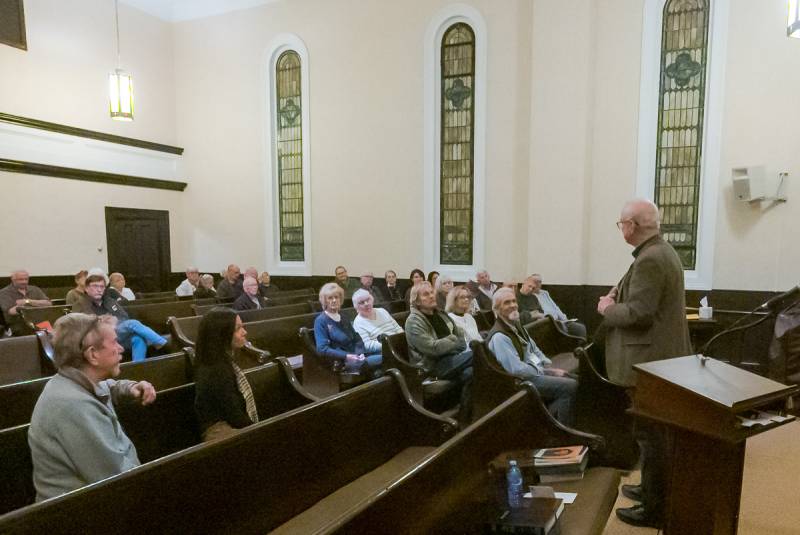
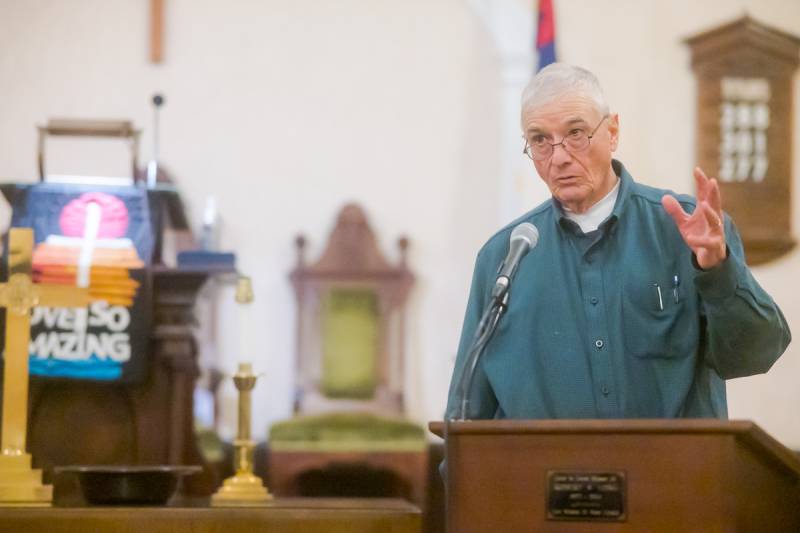
Photo by Howard Owens
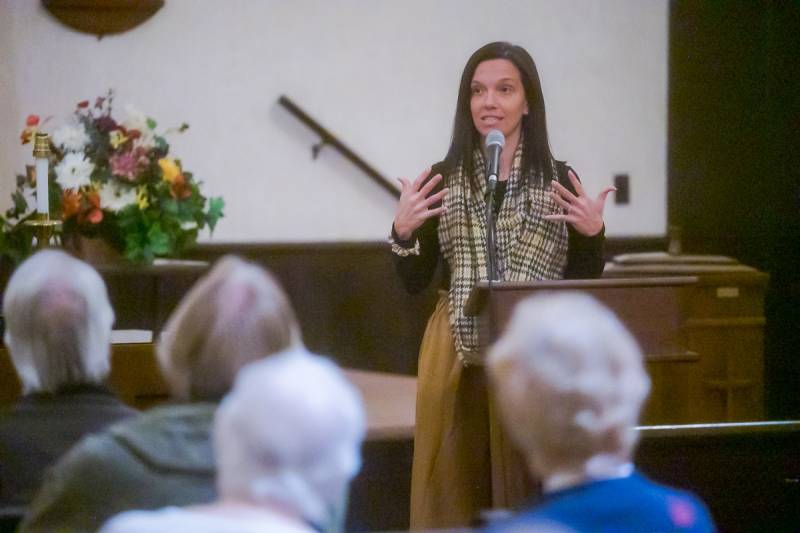
Photo by Howard Owens
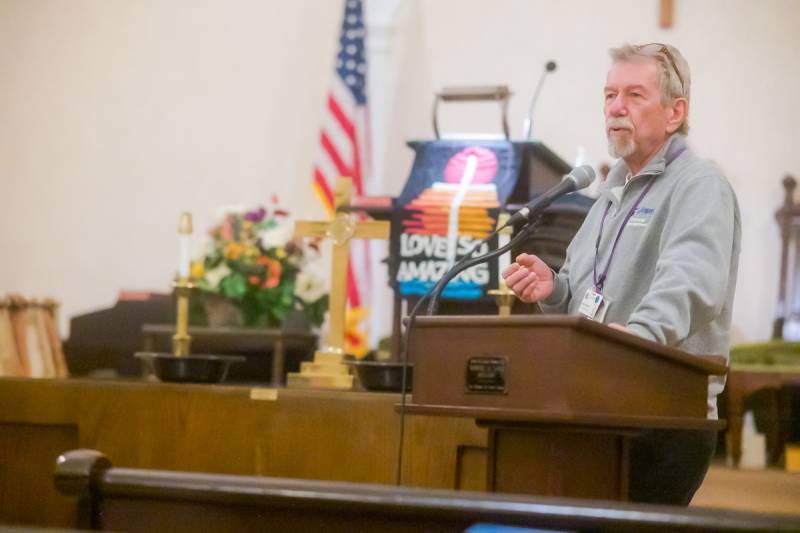
Photo by Howard Owens
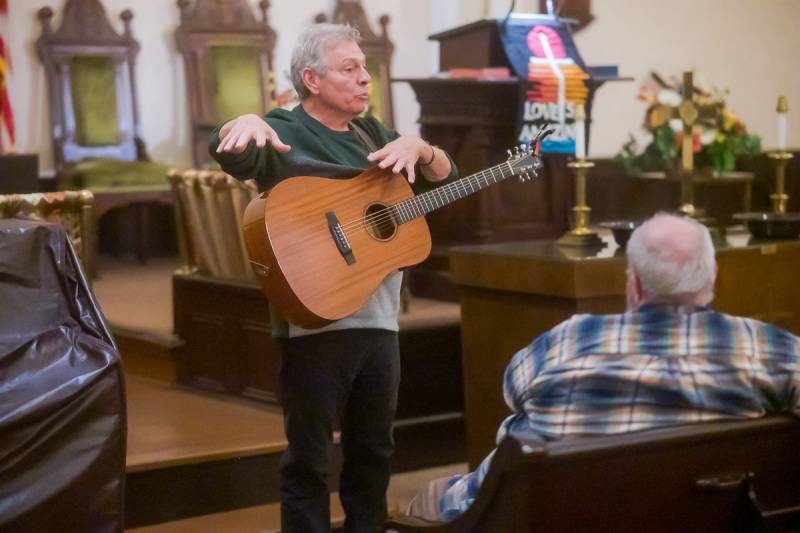
Photo by Howard Owens
